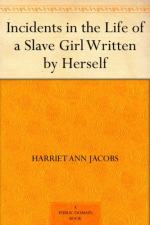He grew vexed, and asked if poverty and hardships with freedom, were not preferable to our treatment in slavery. “Linda,” he continued, “we are dogs here; foot-balls, cattle, every thing that’s mean. No, I will not stay. Let them bring me back. We don’t die but once.”
He was right; but it was hard to give him up. “Go,” said I, “and break your mother’s heart.”
I repented of my words ere they were out.
“Linda,” said he, speaking as I had not heard him speak that evening, “how could you say that? Poor mother! be kind to her, Linda; and you, too, cousin Fanny.”
Cousin Fanny was a friend who had lived some years with us.
Farewells were exchanged, and the bright, kind boy, endeared to us by so many acts of love, vanished from our sight.
It is not necessary to state how he made his escape. Suffice it to say, he was on his way to New York when a violent storm overtook the vessel. The captain said he must put into the nearest port. This alarmed Benjamin, who was aware that he would be advertised in every port near his own town. His embarrassment was noticed by the captain. To port they went. There the advertisement met the captain’s eye. Benjamin so exactly answered its description, that the captain laid hold on him, and bound him in chains. The storm passed, and they proceeded to New York. Before reaching that port Benjamin managed to get off his chains and throw them overboard. He escaped from the vessel, but was pursued, captured, and carried back to his master.
When my grandmother returned home and found her youngest child had fled, great was her sorrow; but, with characteristic piety, she said, “God’s will be done.” Each morning, she inquired if any news had been heard from her boy. Yes, news was heard. The master was rejoicing over a letter, announcing the capture of his human chattel.
That day seems but as yesterday, so well do I remember it. I saw him led through the streets in chains, to jail. His face was ghastly pale, yet full of determination. He had begged one of the sailors to go to his mother’s house and ask her not to meet him. He said the sight of her distress would take from him all self-control. She yearned to see him, and she went; but she screened herself in the crowd, that it might be as her child had said.
We were not allowed to visit him; but we had known the jailer for years, and he was a kind-hearted man. At midnight he opened the jail door for my grandmother and myself to enter, in disguise. When we entered the cell not a sound broke the stillness. “Benjamin, Benjamin!” whispered my grandmother. No answer. “Benjamin!” she again faltered. There was a jingle of chains. The moon had just risen, and cast an uncertain light through the bars of the window. We knelt down and took Benjamin’s cold hands in ours. We did not speak. Sobs were heard, and Benjamin’s lips were unsealed;




